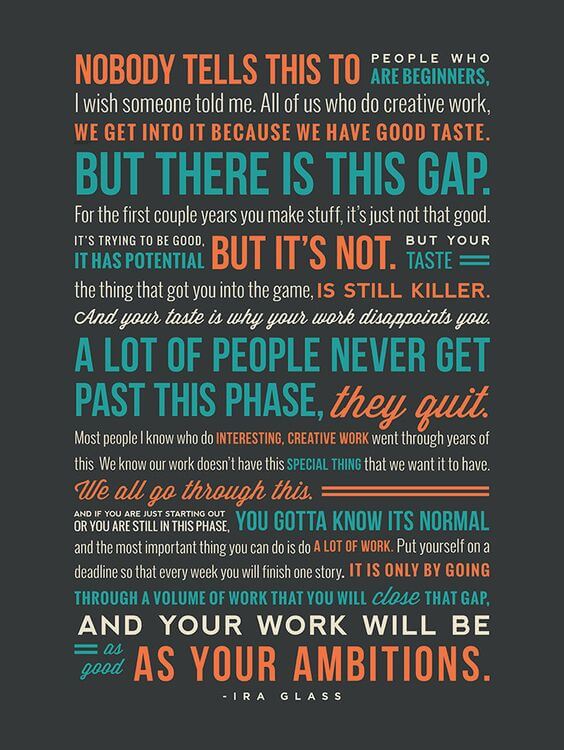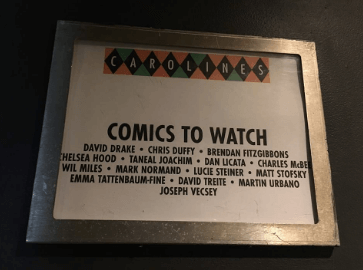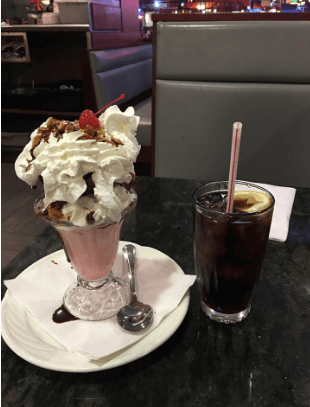How to bounce back after bombing: learn from comedians

Have you heard this quote from Ira Glass?
“What nobody tells people who are beginners — and I really wish someone had told this to me . . . is that all of us who do creative work, we get into it because we have good taste. But there is this gap. For the first couple years you make stuff, and it’s just not that good. It’s trying to be good, it has potential, but it’s not.
But your taste, the thing that got you into the game, is still killer. And your taste is why your work disappoints you. A lot of people never get past this phase. They quit. Most people I know who do interesting, creative work went through years of this. We know our work doesn’t have this special thing that we want it to have. We all go through this. And if you are just starting out or you are still in this phase, you gotta know it’s normal and the most important thing you can do is do a lot of work. Put yourself on a deadline so that every week you will finish one story.
It is only by going through a volume of work that you will close that gap, and your work will be as good as your ambitions.”
Well, now you have. The first time I read it, I bawled, but these days I just get the kind of tears that sort of stick to your eyeballs. Age and experience have toughened me.
At some point, early in your comedy journey, you will experience your first big honkin’ failure. This will stand apart from just “not being good yet,” and will instead be a true failure. Just like with heartbreak, your first will sting hardest because you don’t yet have the tools to deal with it.
I’d like to tell you how an experienced failure-ista such as myself processes, recovers from, and grows better through failure so that, when you hit your first big comedy fail, you are prepared to rebound like a champ!
My Failure Story:
I did standup one night at a bar and I failed. I’m kind of a pro at failing (true humble brag), so I want you to pay attention not just to the failure itself, but to how I reflected upon it and used it to grow.
I was doing lots of small standup shows to prepare for one big show, a Comedy Central showcase that my manager had managed to book for me. It was kind of shocking because I don’t consider myself a standup comic… like, at all. I had done years of sketch comedy, comedic acting, and essay writing, but standup is it’s own animal and I had very little experience with it. However, I said YES!… and figured, I better become a standup comedian! Fast! My wonderful friend and collaborator, director Preston Martin, would schlep out to these little shows with me to watch my work and give me notes on the writing and performance after each one.
This one night, Preston couldn’t make it. I got a little giddy and wanted to take some risks, so I opted to wing it a little.
Onstage, I waded into some subject matter that was a little taboo. I guess I have to tell you. (Facepalm emoji.) For some reason, I thought that cold sores, as in mouth herpes, would make for interesting subject matter. I feel like, statistically, since so many humans get them, and since many people would be kissing that very Saturday night, that it wasn’t the most outrageous topic to bring up. However, I immediately saw my audience stiffen. Wrong crowd. It occurred to me that these folks were very young, terrified of herpes, and also that I wasn’t funny. So I was just an unfunny person on a stage talking about a virus that frightens people. (Multiple facepalm emojis.)
Then, since the trash fire had already begun, I made a joke about book clubs, which wound up with the line “I’m never gonna join your book club, so stop asking.” Of course, the one friend I had in the audience had just invited me to join her book club, something I only realized as the super-aggro non-joke slipped out of my mouth. In a neat thirty seconds, I had alienated my one remaining ally in the audience.
My whole set was bad, not just those two unsavory moments. My hands were sweating. The small of my back was sweating. My throat was tightening. I returned to some familiar material that had worked in the past, but it was too late. I stayed onstage until I saw the emcee mercifully wave her lit phone at me, the signal that I could stop shooting this dead horse and would be allowed to exit and lick my wounds away from the public eye.
To be clear, I’ve had other nights where I went off script and improvised some gems that I’m still using. This could have gone either way. But it went down, way down. Number a billion with a bullet.
I managed to get through the aftermath and return to the stage again — and did the Comedy Central showcase to boot. Having fallen so squarely on my face in preparation for the showcase was, indeed, one of the factors that made my performance that big night so solid. For the showcase itself, I stuck to my jokes that worked. I was emboldened by having experienced the worst and gotten it out of the way a week prior. I did a great job at the showcase and was happy with all the preparation I’d put in: The successful open mics and the failed ones, too.
Nowadays I do standup in the form of hosting HQ Trivia and hosting fundraiser events and whatever else I’m asked to do. I’m no longer afraid of standup and I can confidently put it on my resume, which opens up my job opportunities.
Since I had no guide in this particular out-of-my-comfort-zone journey, I want to provide one for yours. Here’s how I handle this kind of failure, and my advice to other temporary-failures like me.
Be gracious.
Sometimes, failure is obvious to the beholder. But other times, what feels fail-y to you looks great from the outside. Continue to be kind to those around you in the moments that follow your failure. Don’t let your self-loathing stink up the room. To my credit that night, I stuck around to socialize with the other comics and I thanked the women who had taken a risk to book me as a newbie. I thanked the friend who had come only to be made fun of for her (probably very impactful and empowering) book club. This takes wisdom and an eye toward the long game of networking and building relationships. This is just one night. It’s not a domino.
Find something you did well.
After a dumpster-fire experience, after your initial shock wears off, reflect on what did go well. One thing? Before the memory calcifies as a categorically “not good” one, see if you can salvage some tiny positive takeaway. In my case, I can say, looking back, that it was brave of me to get up and depart from my crafted jokes and try some looser, improvised stuff. It didn’t work that night, but some of it did the next time I tried it.
See how finding something good can place your failure in a larger context as part of a learning curve? No? You’re still mortified and angry about dropping your lines in the school play? Well. I’ve been there, too.
Consider how you might have misgauged your audience.
As I went home that night on the subway, replaying my failure, I saw that the audience had been younger than I’d anticipated and that some of my material on dating had freaked them out. I remembered squinting through the bar stage lights at the young couples and thinking, “Oh, this is only funny to me ’cause I’m like nine years older than they are.” This is what is meant by, “Know your audience.”
Choose one exciting point of improvement that you can’t wait to crush text time.
I felt terrible inertia after bombing that night. I didn’t want to get up and perform again, but I had the looming deadline of the Comedy Central showcase and I wanted very much to nail it.
I recommitted to my next small show being precise and tightly scripted, but bringing the feeling of improv to it. I took what felt safe in previous shows and married it with what had felt so dangerous when I failed. That next practice show was electrified by the specter of failure and my renewed commitment to clearer jokes and better writing.
This pendulum of safety and risk will be the most consistent aspect of our process. Risk will sometimes mean glory and will sometimes mean failure.
Final thoughts!
Ice cream. Can help with failure. Preferably ice cream with a friend, but ice cream alone is acceptable, under the circumstances. I like to have ice cream to celebrate both success and failure, because it reinforces this central tenet of comedy: Ice cream will still be there when you fail. Life goes on!
End of article. Now here’s some other stuff:

HERE IS THE ICE CREAM PHOTO.

I was gonna go home to sleep, but instead I decided to eat this sundae in a diner and tell you about someone special. Preston has been coming to my open mics these past two weeks in various basements to listen to some wonderful comics, but also massive quantities of homophobic and misogynistic sludge while he waited for me to go up. He has guided me with his wonderful directorial and dramaturgical insights and has helped me bridge the gap btwn skills I have and new ones I’m building. I’m so thrilled about the pathways stand up will open for me and these two weeks have left me with an enormously positive stockpile of good energy to take with me into more cruddy places where funny women are needed. Tonight’s show was awesome and I’m so happy that Preston extended this offer and his time to sit with me as I prepared. So this long post is to acknowledge him even tho all of Facebook already knows he’s the best. Duh.
(Main photo via Nikki Hampson)
